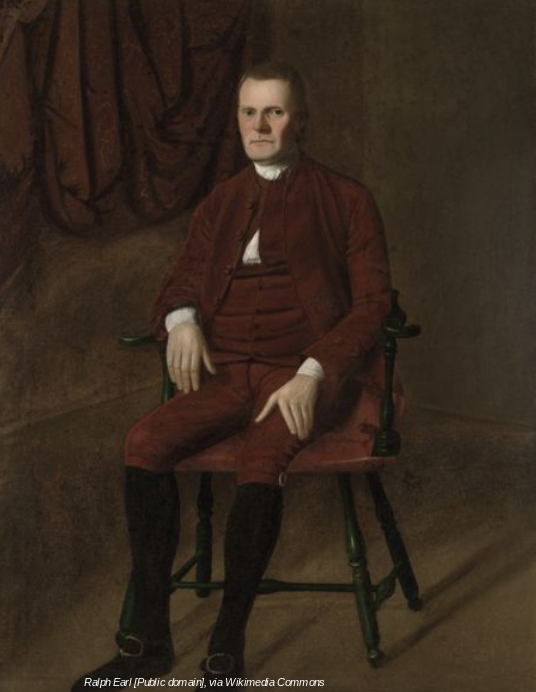Mark Cole
continued from last week
Throughout his life, Roger Sherman put the interest of Connecticut above all else. Therefore, when the opposition to the Stamp Act of 1765 devolved into social disorder, he broke with his former allies, the Sons of Liberty. Likewise, as a town leader in New Haven, he did not tolerate the lynching of loyalists.
Throughout his long public career, Sherman showed a strong distaste for lawlessness or mob-like activities. In that regard, some undoubtedly thought that Sherman was soft on the question of independence, but they were mistaken.
Roger Sherman was an early advocate of pressuring merchants who continued doing business with the Crown and he headed the local body that coordinated the independence movement among the colonies, the New Haven Committee of Correspondence. At the end of the day, Sherman was a thoroughly convinced patriot, but also a law and order patriot. Basically, he was a friend of liberty and he sought to protect liberty whether it was threatened from without by the Crown, or from within by mob rule.
And he had no interest in using the force of government as a means of experimenting with novel social theories. M.E. Bradford put it well, writing that the “mainspring of his politics…in his public life, was devotion to the established, well-tested, and long self-governing regime of Connecticut….Sherman acted to protect an existing Connecticut, not to defend an abstract principle.”
Eventually, of course, Sherman would be pushed so far that he was forced to advocate not just independence, but armed resistance to the abuses by the Crown. For him, the breaking point came with the occupation of Massachusetts by red coats and the forced closure of the port of Boston in 1773.
The Articles of Association of 1774 made perfect sense to Sherman and he gladly signed them. By the time he attended the Second Continental Congress in Philadelphia, Sherman was no less devoted to the cause than any of the members from Massachusetts.
In the Congress, Sherman’s work ethic rivaled John Adams and for these reasons he was selected to play the role in American history reserved for only five extraordinary men. On June 10, 1776, he was asked to serve on a committee responsible for producing the draft Declaration of Independence. The others were Thomas Jefferson, John Adams, Benjamin Franklin and Robert Livingstone.
These five titans worked well together, and Adams would later describe Sherman as “an old Puritan, as honest as an angel and as firm in the cause of American independence as Mount Atlas.” Thomas Jefferson once said that Roger Sherman was “a man who never said a foolish thing in his life.”
After Connecticut (together with the other colonies) declared its independence and prior to attending the Constitutional Convention, Sherman worked with Richard Law to codify and organize the laws of Connecticut in a massive work with the descriptive title, Acts and Laws of the State of Connecticut.
After independence was obtained, Sherman’s work for Connecticut and America was far from done. Sherman was one of the most prominent members of the Philadelphia Constitutional Convention, speaking on well over a hundred occasions. He was also the author of what we have come to know as the Connecticut plan, or the Great Compromise: the people would be represented in the Congress in the House of Representatives, while the states would be represented in the Senate. (Sherman, of course, would later serve in both houses under the Constitution).
Sherman also had an interesting take on the Constitution. Like the Antifederalists, he advocated a strict enumeration of the powers of the federal government. For that reason, unlike the Antifederalists, he opposed a federal bill of rights: state declarations of rights are completely untouched by the federal charter, argued Sherman, and are therefore not only still in effect, they are also the best indicator of what the residents of that state deem to be important.
Federal intervention into these issues, whether expanding or contracting the rights of individuals, was in Sherman’s view, a dangerous precedent. With his prescience, it is easy to see why Sherman is still regarded as one of the wisest founding fathers.
Sherman was also extremely influential in the ratification debate and Connecticut was not an easy victory for proponents of the Constitution. The people needed to be convinced, so Sherman wrote a series of persuasive essays which were published in numerous local papers.
His personal moral authority was on the line and once again, Roger Sherman, who was in his late 60’s when the Connecticut ratification convention met, was able to convincingly advocate the Constitution. Connecticut, like the other colonies, ratified the Constitution. And Roger Sherman would continue to serve under that Constitution, until he died at the age of 71, serving simultaneously as the Mayor of New Haven and as a United States Senator. He was buried near his beloved Yale.
***
Sherman is the only member of the Continental Congress who signed the Articles of Association of 1774, the Declaration of Independence, the Articles of Confederation, and the United States Constitution.
In a fitting summary of his life’s work, Sherman once published a sermon where he wrote,
For more awesome stories about the Signers –
Check out Mark’s book:
Lives, Fortunes, Sacred Honor: The Men Who Signed the Declaration of Independence














